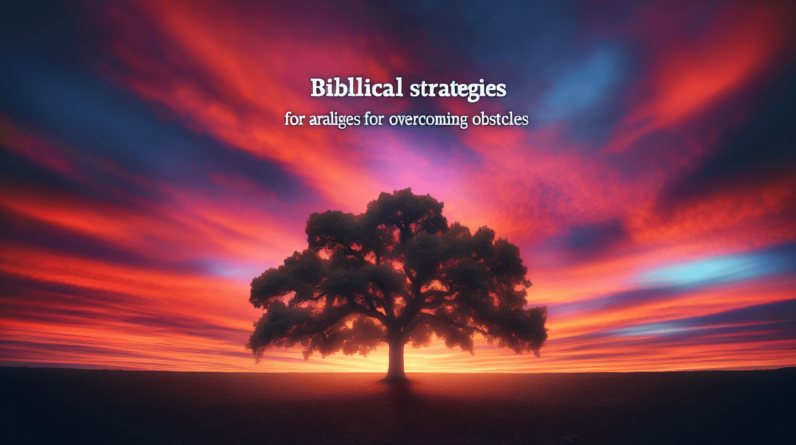Do you ever find yourself pondering the concept of faith and its significance in your life? Let’s take a moment to explore biblical perspectives on faith, specifically examining the insightful words found in Hebrews 11:1. This verse provides a profound and inspiring understanding of faith, shedding light on its essence and affirming its transformative power. As we delve into this topic, we will gain a deeper understanding of how faith can shape our lives and guide us towards a brighter tomorrow. So, let’s embark on this enlightening journey together and discover the timeless wisdom encapsulated in the scriptures.
Definition of Faith
The meaning of faith in the Bible
Faith, as defined in the Bible, is a confident and unwavering trust in God and His promises. It is the belief in something that is not seen or tangible, but is rather based on a deep conviction of truth. Faith is an essential element in the lives of believers, as it allows them to have a personal relationship with God and to experience His power and guidance.
Faith as the assurance of things hoped for
In the Bible, faith is described as the assurance of things hoped for. It is the confidence that what we hope for will come to pass, even though we may not see it yet. This aspect of faith requires us to trust in God’s faithfulness and to hold onto His promises, knowing that He is able to fulfill them in His perfect timing.
Faith as the conviction of things not seen
Another aspect of faith is the conviction of things not seen. It is the belief in the existence of things that are beyond our natural senses or comprehension. This requires us to have a spiritual perspective and to trust in the unseen realm, knowing that God is at work in ways that we cannot fully understand or perceive.
Faith as a Gift from God
God’s role in giving faith to individuals
Faith is not something that we can generate on our own. It is a gift from God that He graciously bestows upon His children. God initiates and sustains our faith, working in our hearts to cultivate a deep trust in Him. It is through His grace and the work of the Holy Spirit that we are able to have faith in God and His promises.
The importance of seeking God for faith
While faith is a gift from God, it is also something that we need to actively seek and pursue. We are called to seek God’s presence and to develop a personal relationship with Him. As we spend time in His Word, in prayer, and in fellowship with other believers, our faith is strengthened and nurtured. Seeking God for faith involves surrendering our doubts and fears to Him, trusting that He will provide us with the confidence and conviction needed to walk in faith.
Examples of individuals receiving faith from God in the Bible
Throughout the Bible, we see numerous examples of individuals who received faith directly from God. One such example is Abraham, who believed in God’s promise of descendants despite being old and childless. God bestowed upon him the faith to trust in His plan and to obey Him wholeheartedly. Another example is Moses, who initially doubted his ability to lead the Israelites out of Egypt. However, God gave him the faith and confidence he needed to fulfill the task. These examples highlight how God equips His people with faith when they are called to fulfill His purposes.
Examples of Faith in the Bible
Abraham’s faith in God’s promise of descendants
Abraham is often referred to as the father of faith in the Bible. His unwavering trust in God’s promise of descendants, despite the physical limitations he and his wife faced, serves as a powerful example of faith. Abraham’s faith was not based on worldly evidence, but rather on the trustworthiness of God’s character. His belief in God’s promises led to the birth of Isaac, fulfilling God’s covenant with him.
Moses’ faith in leading the Israelites out of Egypt
Moses was chosen by God to lead the Israelites out of the bondage of slavery in Egypt. Initially, Moses doubted his ability to fulfill this monumental task. However, as he encountered God and witnessed His power, Moses’ faith grew. He trusted in God’s provision and guidance, leading the Israelites through the Red Sea and towards the promised land. Moses’ faith in God’s faithfulness and power is a testament to the transformative nature of faith.
Daniel’s faith in God’s protection in the lions’ den
Daniel’s faith in God’s protection is demonstrated in the well-known story of the lions’ den. Despite the threat of death, Daniel remained faithful to God and trusted in His deliverance. His unwavering faith led to a miraculous intervention, with God shutting the mouths of the lions. Daniel’s story emphasizes the power of faith in overcoming seemingly impossible situations and in experiencing divine intervention.
The Relationship Between Faith and Works
The belief that faith without works is dead
In the book of James, it is stated that faith without works is dead. This means that faith is not merely a passive belief, but it requires action. True faith is accompanied by a transformed life that reflects God’s love and righteousness. Good works are not a means to earn salvation, but rather an outpouring of a genuine faith in God. It is through the combination of faith and works that a believer’s faith is made evident and brings glory to God.
The importance of expressing faith through actions
Actions are a tangible expression of one’s faith. When we truly believe in God and His promises, our faith naturally produces actions that align with God’s will. These actions may include acts of kindness, service to others, obedience to God’s commands, and sharing the Gospel with others. By expressing our faith through actions, we become living testimonies of God’s transformative power and love.
Examples of individuals in the Bible who demonstrated their faith through works
The Bible is filled with examples of individuals who demonstrated their faith through works. One such example is Rahab, a prostitute in Jericho, who risked her life to hide the Israelite spies and played a vital role in their victory. Her actions were driven by her faith in God and her belief that He was the true God. Another example is the disciple Peter, who boldly preached the Gospel and performed miracles, demonstrating his absolute trust in Jesus. These examples remind us that faith is not passive, but active and alive, transforming both our hearts and actions.
The Power of Faith
Faith as a source of strength and courage
Faith serves as a source of strength and courage in times of adversity and trials. It allows believers to persevere and endure, knowing that God is with them and will provide strength and comfort. With faith, individuals are empowered to face challenges head-on and overcome obstacles that may seem insurmountable.
The ability of faith to overcome obstacles and challenges
Faith has the power to overcome obstacles and challenges that may appear impossible to conquer. It allows individuals to rise above their circumstances and believe in the miraculous power of God. Throughout the Bible, we see countless examples of individuals who faced overwhelming odds but were victorious because of their unwavering faith in God.
The role of faith in miracles and supernatural interventions
Faith plays a crucial role in experiencing miracles and supernatural interventions from God. When individuals trust in God and His power, they open themselves up to the possibility of divine interventions. The Bible is replete with accounts of incredible miracles that occurred because of individuals’ faith. From healing the sick to raising the dead, faith acts as a catalyst for the manifestation of God’s power and supernatural works.
Faith in Times of Doubt and Uncertainty
The struggle to maintain faith in difficult circumstances
In difficult circumstances, it is natural to experience doubt and uncertainty. Even the strongest believers may question their faith at times. However, it is during these moments that faith is truly tested and refined. It is important to acknowledge the struggle and seek God with honesty and vulnerability, asking Him to strengthen our faith and provide us with the reassurance we need.
Biblical examples of individuals who experienced doubt
The Bible offers numerous examples of individuals who experienced doubt and uncertainty. One such example is the apostle Thomas, who initially doubted Jesus’ resurrection until he saw Jesus with his own eyes. Another example is King David, who expressed his doubts and fears through the Psalms but ultimately held onto his faith in God. These examples remind us that doubt is a normal part of the human experience but can be overcome through seeking God and His truth.
Reaffirming faith through prayer, meditation, and community
In times of doubt, it is crucial to reaffirm our faith through prayer, meditation on God’s Word, and seeking support from the Christian community. By engaging in prayer, we open ourselves up to God’s presence and guidance, allowing Him to speak truth into our hearts. Meditating on God’s Word reminds us of His faithfulness and promises, giving us the strength to persevere. Additionally, seeking support and encouragement from fellow believers provides a sense of community and reminds us that we are not alone in our struggles.
Faith as an Active and Living Concept
The call to actively practice and live out faith
Faith is not meant to be a passive belief that remains stagnant. It is a call to actively practice and live out our faith in every aspect of our lives. This involves aligning our actions, thoughts, and desires with God’s will and seeking to honor Him in everything we do. Active faith requires obedience, surrender, and a willingness to allow God to transform us from within.
The idea of faith as a lifelong journey
Faith is not a one-time event but rather a lifelong journey of growth and transformation. It is a continuous process of deepening our relationship with God, seeking to know Him more, and allowing our faith to shape every area of our lives. As we walk with God and experience His faithfulness, our faith is strengthened and refined, leading to a deeper and more vibrant relationship with Him.
The transformative effects of faith in personal and communal life
Faith has the power to transform both our personal lives and our communities. In our personal lives, faith brings purpose, joy, and a sense of peace despite life’s challenges. It directs our decisions, aligns our values, and provides a foundation upon which we can build our lives. In communities, faith fosters unity, love, and compassion, as believers come together to worship God and serve others. The transformative effects of faith extend far beyond individual lives, creating a ripple effect that impacts the world around us.
The Importance of Faith in Christian Theology
Faith as a foundational belief in Christianity
Faith is a foundational belief in Christianity, as it is through faith that individuals receive salvation and enter into a relationship with God. The Bible teaches that it is by grace through faith that we are saved, not by our own works or merit. Faith is the key that unlocks the door to God’s forgiveness, love, and eternal life.
The role of faith in salvation and relationship with God
Faith plays a crucial role in both our salvation and our ongoing relationship with God. It is through faith that we acknowledge Jesus Christ as our Lord and Savior, believing in His sacrificial death and resurrection for the forgiveness of our sins. Faith allows us to enter into a personal relationship with God, as we trust in His love, guidance, and provision for our lives.
The significance of faith in Christian discipleship and mission
Faith is not only important for salvation but also for Christian discipleship and mission. A deep and vibrant faith compels believers to follow Christ wholeheartedly, to grow in intimacy with God, and to live out His purposes. Faith empowers believers to proclaim the Gospel and make disciples, as they trust in God’s power to transform lives and bring about His kingdom on earth.
Faith as a Key Component in Christian Life
The virtue of faith and its cultivation in believers
Faith is considered a virtue in the Christian life, as it is a characteristic that aligns believers with God’s character. It is a virtue that can be cultivated and developed through prayer, studying Scripture, and actively seeking to grow in relationship with God. As believers nurture their faith, they become more attuned to God’s voice and more aligned with His will.
How faith impacts decision-making and worldview
Faith has a profound impact on decision-making and worldview. It shapes the lens through which believers view the world and guides their choices in alignment with God’s truth. Faith enables individuals to make decisions based on trust in God’s guidance and wisdom, rather than solely relying on their own understanding or worldly knowledge.
The role of faith in fostering hope, love, and forgiveness
Faith is intricately connected to hope, love, and forgiveness. It is faith that instills hope in the midst of despair, love in the face of hatred, and forgiveness in the presence of hurt and pain. Through faith, believers are able to extend grace and love to others, knowing that they themselves have received immeasurable grace and love from God.
Practical Application of Faith in Daily Life
Ways to strengthen and nurture faith
There are various ways to strengthen and nurture faith in daily life. Engaging in regular prayer, reading and studying Scripture, participating in worship and fellowship with other believers, and serving others are all practices that can deepen one’s faith. Additionally, seeking out Christian mentors and accountability partners can provide guidance and support in the growth of faith.
Integrating faith into daily routines and activities
Faith should not be compartmentalized or limited to specific religious activities. It is important to integrate faith into every aspect of daily life. This can be done by praying throughout the day, seeking God’s guidance in decision-making, and infusing God’s truth into daily conversations and interactions. By intentionally living out one’s faith in all areas of life, faith becomes a natural and integral part of daily routines and activities.
Applying faith to challenges and decision-making
Challenges and decision-making provide opportunities to apply faith in practical ways. By trusting in God’s wisdom and guidance, believers can approach challenges with confidence and seek His guidance in decision-making. Faith enables individuals to step out in boldness, knowing that God is faithful to lead and provide. It allows believers to surrender their fears and doubts to God, trusting in His perfect plan and provision.
In conclusion, faith is a fundamental aspect of the Christian life that is rooted in a confident trust in God and His promises. It is a gift from God, cultivated and strengthened through seeking Him and His truth. Faith impacts every aspect of life, from personal relationships to decision-making, and from service to witnessing. It empowers believers to persevere in times of doubt and uncertainty, and to actively live out their faith through works that bring glory to God. By nurturing and applying faith in daily life, Christians can experience the transformative power of a vibrant and active faith in God.







